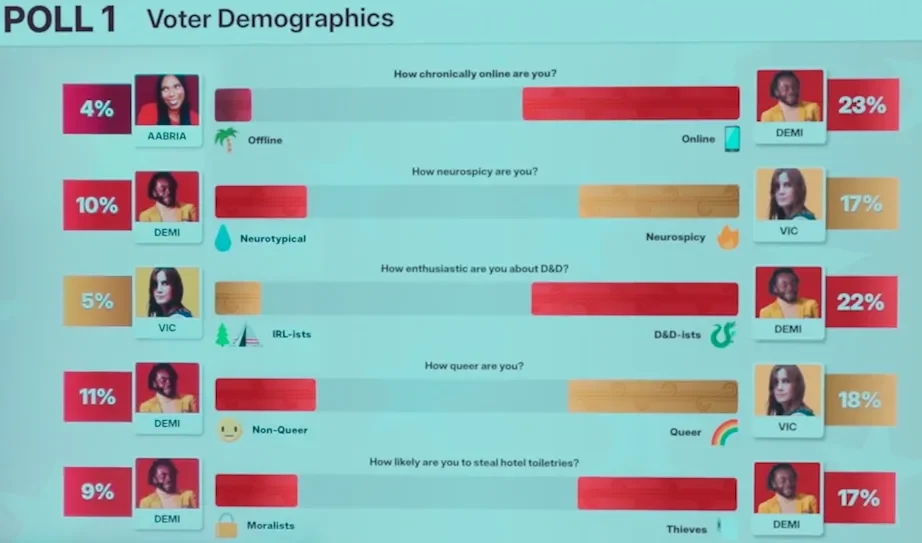Editor's note: This article was originally published in The Surveyor, YouGov America's weekly email newsletter. It has been revised for publication here. Subscribe to The Surveyor for regular updates on YouGov's polling.
This week I settled down on my couch to watch the latest episode of Game Changer, a game show from streaming service Dropout where contestants compete in a game that, well, changes every episode. The most recent episode, Outvoted, ended up being an election parody: Comedians Demi Adejuyigbe, Ally Beardsley, Aabria Iyengar, Vic Michaelis, and Brennan Lee Mulligan tried to win the most votes from members of a studio audience. And 14 minutes into the episode, they introduced the gimmick that explains why I'm talking about this to you here today: polling crosstabs.
Below is a screenshot of the graphic Game Changer showed, displaying which of the five contestants was leading in 10 different audience subgroups. But this being a comedy show, these subgroups weren't from boring crosstabs such as gender, education, or party identification. Instead they were based on audience responses to questions such as, "How chronically online are you?" and "How likely are you to steal hotel toiletries?"

As a dataviz professional I am somewhat confused about what this chart is showing. It appears to be a standard stacked bar chart with a left option, a right option, and a grey option in the middle. But on closer examination I think the grey bar is just there for scale — the colored bars show the share of support received by the most popular candidate in each group.
But as a polling professional, I saw an opportunity. Game Changer asked these polling questions as a joke. But YouGov could poll them for real.
So on Tuesday afternoon we pushed out a new poll into the field that asked variants of Dropout's five questions. I say variants, because some of Dropout's questions don't match YouGov's style for asking questions in a neutral manner, and some relied on jargon — such as "neurospicy" — that not all respondents might understand. But we asked questions that we could re-format1 to match all five of Dropout's categories:
With all that done, it was time to apply these crosstabs to the election. No, not the Game Changer race for Honorary President of Dropout, but an election most people have an opinion about: the 2024 presidential race.
Donald Trump narrowly won this election, and our poll of registered voters accordingly has 44% having voted for Trump, 43% voting for Harris, 1% for another candidate, and 12% not voting — a net margin of +2 for Trump. All figures reflect rounding.
Harris fared better among the chronically online, with a 1-point lead, but lost by 4 points among non-chronically online voters.
Trump won among both neurotypical voters (+2) and the neurospicy (+3).
In a vote for Dungeon Master, Harris might have come out on top. She won voters who play D&D by 1 point, and lost those who never play D&D by 4 points.
By far the most politically polarized of the five Game Changer demographics is queerness. Trump won among non-queer registered voters by 21 points, and lost among queer voters by 27 points.
Finally, Trump won by 10 points among voters who say they never steal hotel toiletries, and lost by 2 points among those who do take them.
Dropout's election is over, but here at YouGov the survey work never ends, because the only way to learn is by polling.
Methodology: The poll was conducted among 1,137 U.S. adult citizens. Respondents were selected from YouGov’s opt-in panel to be representative of U.S. adult citizens. A random sample (stratified by gender, age, race, education, geographic region, and voter registration) was selected from the 2019 American Community Survey. The sample was weighted according to gender, age, race, education, 2024 presidential vote, 2020 election turnout and presidential vote, baseline party identification, and current voter registration status. 2024 presidential vote, at time of weighting, was estimated to be 48% Harris and 50% Trump. Demographic weighting targets come from the 2019 American Community Survey. Baseline party identification is the respondent’s most recent answer given around November 8, 2024, and is weighted to the estimated distribution at that time (31% Democratic, 32% Republican). The margin of error for the overall sample is approximately 4%.
Image: Getty (Pakin Songmor)
What do you think about the election, American politics in general, and everything else? Have your say, join the YouGov panel, and get paid to share your thoughts. Sign up here.
1
- For "How chronically online are you?" we asked "How often do you read online news and social media?" and categorized everyone saying "very often" (40% of registered voters) as "Online" and those who do so less frequently (59%) as "Offline."
- For "How neurospicy are you?" we re-asked questions from a 2024 survey about neurodiversity, and specifically asked people how often they "feel your brain works different from everyone else." Those who say "sometimes," "rarely," or "never" (60%) are labeled "Neurotypical," which means people with normal methods of thinking. Those who say "usually" or "always" (35%) are labeled "Neurospicy," a slang term referring to people who are not neurotypical.
- For "How enthusiastic are you about D&D" we asked people how often they play a number of different types of games, including board games, console games, and — the basis for our poll — tabletop roleplaying games. Those who said they ever played tabletop RPGs (29%) are labeled as "D&D-ists" (ignoring those who play other RPGs but not D&D), while those who never play RPGs (69%) are labeled as "IRL-ists"
- For "How queer are you?" we categorized Americans based on their answers to two different questions: "Please try to place your sexuality on a scale of 0 to 6, where 0 is completely heterosexual and 6 is completely homosexual (i.e. gay or lesbian)" and "Please try to place your gender identity on a scale of 0 to 6, where 0 is completely masculine and 6 is completely feminine." Those who say they are something other than "completely heterosexual," or who are men with a gender identity other than "completely masculine" or women with a gender identity other than "completely feminine" are classified as "Queer," while "Non-queer" includes people who say they are "completely heterosexual" and that their gender identity completely matches their gender.
- For "How likely are you to steal hotel toiletries," we asked "When staying at a hotel that offers toiletries, do you take the unused toiletries with you when you leave the hotel?" People who say "No, I don't do this" are labeled "Moralists," and those who say "Yes, always" or "Yes, sometimes" are labeled "Thieves."












